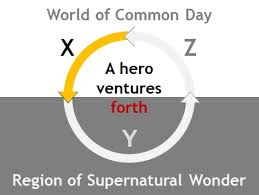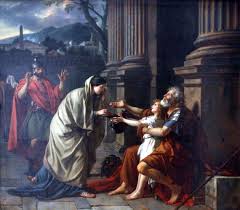Another literary work of fiction that follows the Hero’s Journey is the Lord of the Rings trilogy. As any work that follows the Hero’s Journey, this story begins in the Hero’s familiar home. We see the Hero’s ordinary life, and we observe how the call to action impacts their life. The hero may initially refuse the call; not wanting to leave their normal life behind. But, after a little convincing, the hero accepts the call to adventure. The hero and company take off on an adventure, and encounter numerous difficulties along their journey. The hero meets a mentor, who adventures alongside them in their journey. After overcoming a true, supreme challenge of wits and strength, the hero begins their journey back home. The Hero’s Journey is a long road with challenges, but the Hero eventually returns home as a different person from when they left.

The Hero of The Lord of The Rings would be Frodo. This young man is the hero on this journey, and at the beginning of the trilogy, we see his ordinary life. In the fictional land of Hobbiton, Frodo lives peacefully with his cousin and guardian, Bilbo, his friend, Sam, and other townspeople. In its own way, this land reflects an aspect of what it means to be human. We can live our lives in mediocrity no problem, but at some point, we are called to adventure. We are called to take on challenges, and to leave our comfortable lives. This is also related to religion. More specifically, what I know about Christianity is that we may be comfortable in our lives, but we need to challenge ourselves to be selfless and take actions that will change our lives for the better. To develop an altruistic attitude is my belief for the abandonment of the comfortable; often sinful lifestyle before selflessness. Christian altruism is my point of view when it comes to leaving comfort for the sake of selflessness. As any writing of what it means to be human, part of being human also incorporates the discomfort in choosing to accept the call to action, and the call to selflessness and holiness. The call to action that summons him to adventure would be Frodo’s receiving of the One Ring from his guardian. Additionally, the same mentor, Gandalf, is the convincing imposition of Frodo. With other friends, Mary, Pippin, and Sam, Frodo begins his adventure. Of course, as is our lives, we can hardly overcome challenges and ordeals without the help of others like us. Undoubtedly, experienced or more elderly mentors help with said ordeals and challenges, but it is also beneficial to mind and spirit to be alongside others like ourselves in our adventures throughout our lives. We can see, in The Lord of The Rings, how Frodo and company take charge of their lives, exit the comfort, and change their lives for the greater good.

When taking off on his adventure to change his life, Frodo is in the company of an experienced mentor through the encountered difficulties. Soon after leaving the comfort of home, Frodo and company make it to the town of Bree, where they meet up with a new mentor. This new mentor leads them on their journey. Helping them with difficulty, this mentor is a sizeable help to the hero’s cause. In our own lives, we meet our own mentors who help us with adventuring out into the unknown and away from our normal lives. Parents, friends, religious leaders; all people who can help us on our extensive journeys that our lives are consistent with; all people who can be our mentors to overcome our supreme ordeals. We oftentimes feel lost in our seemingly dramatic or complex lives, but, in reality, it takes experienced mentorship to help us realise there is always hope. And, with this mentor, Frodo becomes more prepared for the eventual supreme ordeal of his Hero’s Journey.
The peak of the story arc of this Hero’s Journey would be the eventual arrival at the site of Mount Doom in Mordor. After so much hardship and adversity, Frodo faces a final challenge, which is to cast the One Ring into the fires of Mount Doom from which it was born. Each new day brings challenges and ordeals, but perhaps the supreme ordeal of all of our lives are yet to come. I can say with relative certainty that my supreme challenge at the top of the mountain; my supreme ordeal is yet to come. This ordeal of destroying the ring would represent the supreme ordeal as indicated by the Hero’s Journey formulated structure. Lastly, the hero returns home; changed.

Upon the return home, the hero reaches the end of his journey, and is back to where he began. Each day, we start our journey, and at the end of the day, we return to where we began. The challenges we face out in the world are our own ordeals in life. We are called to adventure, and make difficult choices that help ourselves and others. We meet experienced mentors, and others just like us who help us with our daily lives. And, although perhaps not today, we come across our supreme ordeal; a challenge at the apex of our adventure. The Hero’s Journey is seen not only in a multitude of film and literary works, but in our own lives.